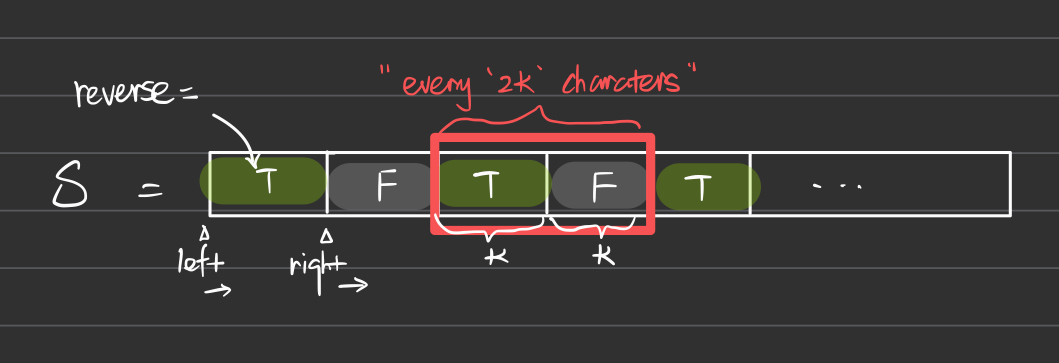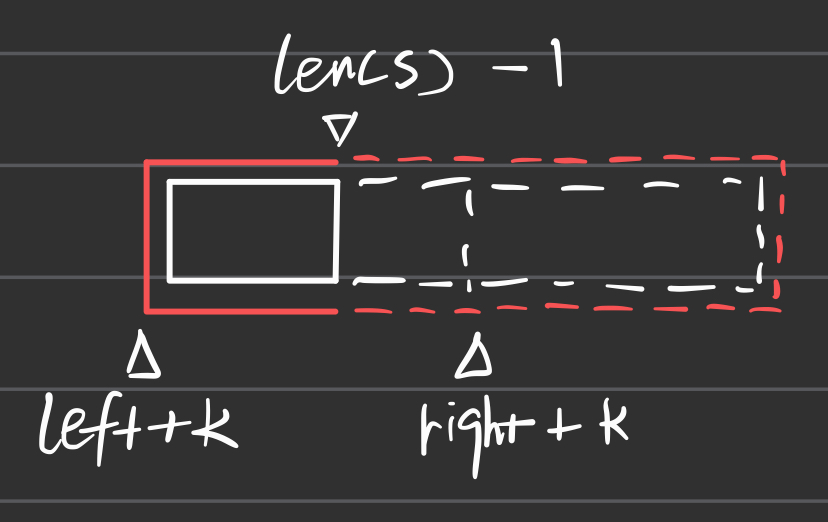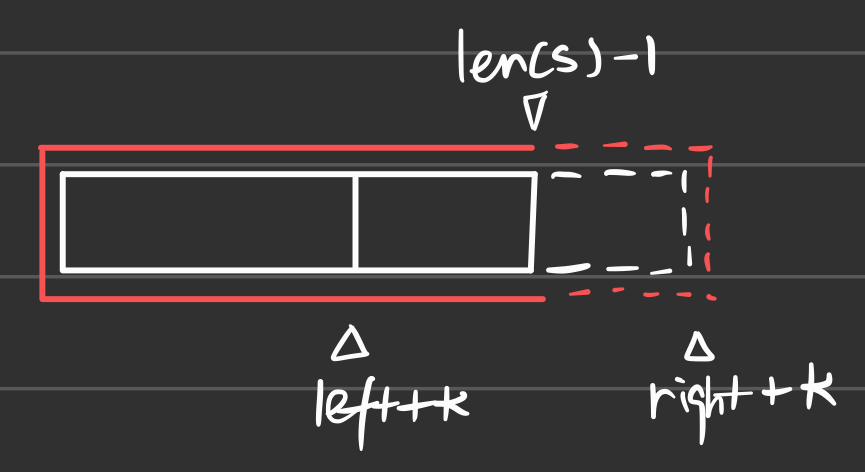Leetcode Day 7 - String Reversal and Manipulation Basics
Description: Focuses on basic string reversal techniques and simple string manipulations. Includes reversing strings and segments of strings, along with replacing numbers in a string.
String
| Diff | Problem | Python | Java |
|---|---|---|---|
 | 344 Reverse String | ✅ | |
 | 541 Reverse String II | ✅ | |
 | Kama-54 Replace Numbers | ✅ |
Reverse String
Write a function that reverses a string. The input string is given as an array of characters s.
You must do this by modifying the input array in-place with O(1) extra memory.
Example 1
1
2
Input: s = ["h","e","l","l","o"]
Output: ["o","l","l","e","h"]
Example 2
1
2
Input: s = ["H","a","n","n","a","h"]
Output: ["h","a","n","n","a","H"]
Thinking Process
The two-pointer method is utilized. Two pointers, starting from the leftmost and the rightmost character of the string respectively. The characters at these pointers are then swapped until the pointers meet in the middle.
When swapping characters in Python, the following traditional method can be used:
1
2
3
4
5
def swap(s,i,j):
temp = s[i]
s[i] = s[j]
s[j] = temp
return s
However, Python allows a more space-efficient and elegant way to perform this operation using tuple unpacking:
1
2
3
def swap(s,i,j):
s[i], s[j] = s[j], s[i]
return s
Solution
Python
1
2
3
4
5
6
7
class Solution(object):
def reverseString(self, s):
n = len(s)
for i in range(n // 2 ):
s[i], s[n - i - 1] = s[n - i - 1], s[i]
return s
Similar Questions
| Diff | Similar Questions | Python | Java |
|---|---|---|---|
 | 541 Reverse String II3 | ✅ | |
 | 345 Reverse Vowels of a String4 | ✅ |
Reverse String II
Given a string s and an integer k, reverse the first k characters for every 2k characters counting from the start of the string.
If there are fewer than k characters left, reverse all of them. If there are less than 2k but greater than or equal to k characters, then reverse the first k characters and leave the other as original.
Example 1
1
2
Input: s = "abcdefg", k = 2
Output: "bacdfeg"
Example 2
1
2
Input: s = "abcd", k = 2
Output: "bacd"
Thinking Process (Python)
1. Conversion Between String and List
- To facilitate easy character swapping within the string, it is first converted into a list using
res = list(s). - When returning the result, the list res is converted back into a string with
''.join(res).
2. Using Two Pointers to Iterate Over Each Block of Length k
The question’s description “reverse the first k characters for every 2k characters,” can be interpreted as reversing every alternate block of length k. Therefore, a boolean variable reverse is used to track whether the current block should be reversed. Specifically:
- The
leftpointer marks the start of each block, while therightpointer marks the end. - Each block follows the rule: if
reverse = True, then reverse the block; otherwise, do not reverse. After processing, reverse is toggled withnot reverseto alternate the behavior for the next block. - The pointers are updated to move to the next block with
left += kandright += k.
When advancing to the last block, besides checking if right + k = len(s) - 1, other special cases may arise:
Solution
Python
[Solution 1]
1
2
3
4
5
6
7
8
9
10
11
12
13
14
15
16
17
18
19
20
21
22
23
24
25
26
27
28
class Solution(object):
def reverseStr(self, s, k):
if k == 1:
return s
res = list(s)
l = len(res)
left = 0
if(k >= l):
right = l - 1
else:
right = k - 1
reverse = True
while(right < l):
if reverse:
for i in range((right - left + 1) // 2):
res[left + i],res[right - i] = res[right - i],res[left + i]
reverse = not reverse
left += k
if right != l - 1 and right + k > l - 1 and reverse:
right = l - 1
else:
right += k
return ''.join(res)
Solution 25
1
2
3
4
5
6
7
8
9
10
11
12
13
14
15
16
class Solution(object):
def reverseStr(self, s, k):
def reverse_substring(text):
left, right = 0, len(text) - 1
while left < right:
text[left], text[right] = text[right], text[left]
left += 1
right -= 1
return text
res = list(s)
for cur in range(0, len(s), 2 * k):
res[cur: cur + k] = reverse_substring(res[cur: cur + k])
return ''.join(res)
Replace Numbers
题目描述
给定一个字符串
s,它包含小写字母和数字字符,请编写一个函数,将字符串中的字母字符保持不变,而将每个数字字符替换为number。 例如,对于输入字符串a1b2c3,函数应该将其转换为anumberbnumbercnumber。
输入描述
输入一个字符串
s,s仅包含小写字母和数字字符。
输出描述
打印一个新的字符串,其中每个数字字符都被替换为了
number
输入示例
a1b2c3
输出示例
anumberbnumbercnumber
Solution7
Python
My Solution
1
2
3
4
5
6
7
8
9
10
11
12
13
14
s = input()
scaned = ""
number = ['1','2','3','4','5','6','7','8','9','0']
res = list(s)
for c in res:
if c in number:
scaned += "number"
else:
scaned += c
print(scaned)
Answer
1
2
3
4
5
6
7
class Solution:
def change(self, s):
lst = list(s) # Python里面的string也是不可改的,所以也是需要额外空间的。空间复杂度:O(n)。
for i in range(len(lst)):
if lst[i].isdigit():
lst[i] = "number"
return ''.join(lst)
Reference
Leetcode-344 Reverse String: https://leetcode.com/problems/reverse-string/description/. ↩︎
代码随想录-反转字符串: https://programmercarl.com/0344.反转字符串.html#算法公开课. ↩︎
Leetcode-541 Reverse String II: https://leetcode.com/problems/reverse-string-ii/description/. ↩︎ ↩︎2
Leetcode-345 Reverse Vowels of a String: https://leetcode.com/problems/reverse-vowels-of-a-string/. ↩︎
代码随想录-反转字符串II: https://programmercarl.com/0541.反转字符串II.html#算法公开课. ↩︎
卡码网-54 替换数字: https://kamacoder.com/problempage.php?pid=1064. ↩︎
代码随想录-替换数字: https://kamacoder.com/problempage.php?pid=1064. ↩︎


